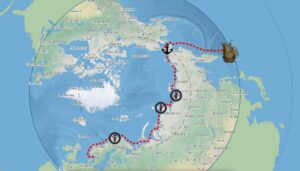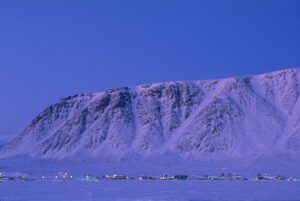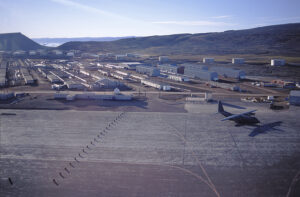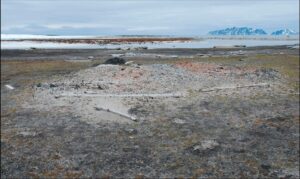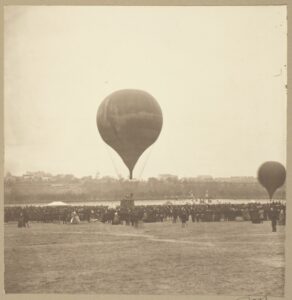ExplorersWeb editor Jerry Kobalenko is no stranger to plaudits. The journalist, photographer, and explorer received Canada’s Polar Medal in 2018 in recognition of a career spent furthering the knowledge of the Canadian north. Now Kobalenko has been recognized again, this time in the form of the Queen Elizabeth II’s Platinum Jubilee Medal.
Kobalenko received the joint Canada-Alberta medal at a ceremony on Nov. 28 “for services to exploration.” According to the Alberta government website, the medal functions as a way to recognize Albertans who’ve made “significant contributions to the province.”

Jerry Kobalenko’s Queen Elizabeth II’s Platinum Jubilee Medal (right) next to his Polar Medal (left). Photo: Alexandra Kobalenko
Across Canada, people were nominated for the medal by Indigenous organizations, members of the Legislative Assembly, various non-governmental community-based organizations, and the Canadian Armed Forces. Kobalenko was nominated by the Royal Canadian Geographical Society, of which he is a Fellow.
Second medal
ExplorersWeb sat down with Kobalenko to talk about the award, what it means to him, what he’s been up to since his last award in 2018, and what adventures he’s got coming up over the horizon.
This is the second medal you’ve received for your work as an explorer in the Arctic, with the first being the Polar Medal in 2018. When you received that medal, you told ExWeb you felt “tremendously excited.” How does this one feel?
Equally thrilled. I feel like a two-star general. It was also exciting to get to wear the Polar Medal at an official event for the first time. I’ve never sought out laurels, which makes getting them unexpectedly so gratifying.
Give us an update on what you’ve been up to since we spoke in 2018. How did the book about Labrador finish up? What are some other notable projects/adventures you’ve undertaken since then?
The book on Labrador is finished. It’s being shopped to publishers now. Regarding other arctic projects since then, I was all set to ski 700km on Baffin Island with ExWeb writer Ash Routen in March 2020. Ten days before our flight to Baffin, the world shut down with COVID. Since then, I’ve been focused on ExWeb. There have always been times (during book writing, for example) when the desk temporarily trumps the expeditions. And in fact, I find research and writing equally fun.

Jerry Kobalenko camped on a drifting ice floe on northern Ellesmere Island because he liked not knowing where he’d wake up. Photo: Jerry Kobalenko
Joys of manhauling
You’ve called manhauling “a beautiful way of life.” What is it specifically about that mode of travel that speaks to you?
Manhauling is active, meditative, pure. It declutters the mind. I backpack too, but the problem is that you don’t go to the Arctic for one or two weeks; you go for one to two months. My packs are never under 40kgs, and have been as high as 54kgs, but carrying those loads are the least enjoyable things I’ve done. Much easier to pull them in a sled or stuff in a sea kayak.
What’s coming up for you in the next few years? Got anything interesting planned?
Lots of ideas, lurking, waiting. This is one of the unfortunate things I notice when I see polar travelers just doing the South Pole or the same traverse across Greenland. There are thousands of original routes left to do in the polar regions, and it’s a pity that adventurers don’t apply more imagination to their choices.

Jerry Kobalenko explores the remains of Frederick Cook’s 1908-1909 overwintering hut on Devon Island. He and a partner then retraced Cook’s trek back toward Greenland. Photo: Jerry Kobalenko
How to begin
You’ve come a long way from that “kid from Montreal” that didn’t know much about the outdoors. As you look back on your career, what are a few big things you’ve learned that you’d like to pass on to other adventurers/explorers who might just be starting out?
JK: Someone asked me last week how to begin to do this when you’ve never done it and don’t know anyone who does it. Polar travel is not as technical as many other forms of wilderness adventure, such as climbing, couloir skiing, or whitewater kayaking. It’s easy to learn quickly by just going for it. You suffer more at first, as you’re learning, but that’s just the price of admission. Cold is not difficult or dangerous at all; it’s just a shopping list and the right attitude.

